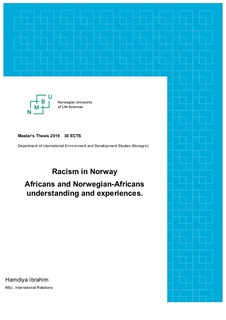| dc.description.abstract | This is a qualitative study with 16 Africans and Norwegian-Africans from Ghana, Nigeria, Uganda and Sudan. The participants were interviewed to explore their racial experiences, coping strategies, their knowledge of human rights laws and institutions and their suggestions on how racism could be reduced. Almost all the participants had experienced some form of racism, except one. Some of the areas that they had experienced racism were transportation, health care, education, accommodation, employment sectors and others. These experiences have affected some physically, emotionally and mentally but most of them have gotten used to it. Four coping strategies were identified by the participants as their way of handling racism: confrontational-standing up for oneself; avoidance-staying away from a situation; positive attitude-adding value to oneself and reporting-communication of an encounter to the appropriate authorities. Making racism a human rights issue could be an effective way to combat it. This makes participants knowledge of human rights laws and institutions extremely significant. The study makes use of human rights Conventions to analyse the data. Arguing this analysis from a human rights perspective, it was discovered that few participants had knowledge of human rights laws and institutions which can help them deal with racism. Most of them had not been in contact with these human rights institutions because they did not have any need for them. Although a few had been in contact with some institutions, one currently has a pending case with Civil Ombudsman against an employer. The participants suggested awareness creation, integration, positive image/attitude and the media as ways of decreasing racism in Norway, whilst socialization and volunteerism aids in the process. People should be educated on the human rights laws that protect them. It could enable them fight for their rights when it is violated. This thesis demonstrates racial experiences from a diverse African perspective as a way of adding African voices to the racism discourse in Norway. | nb_NO |

